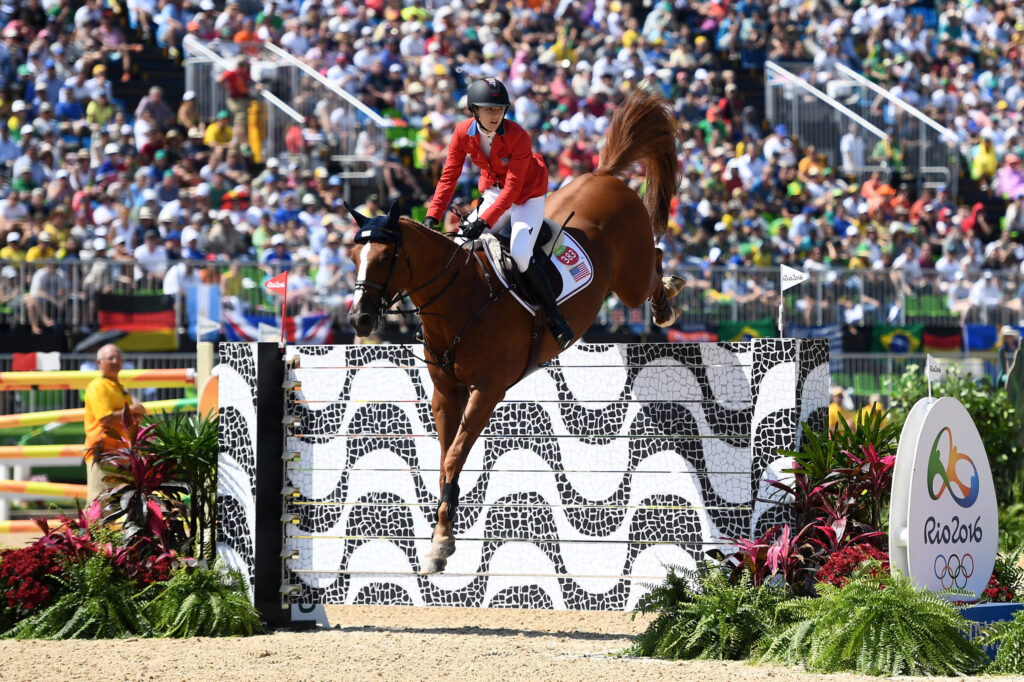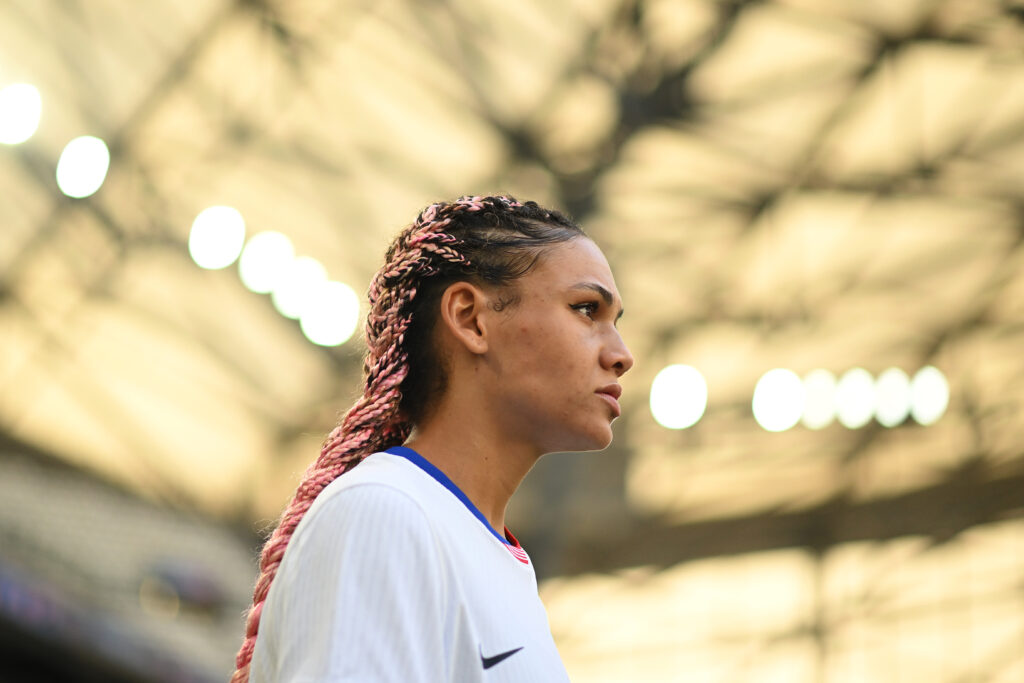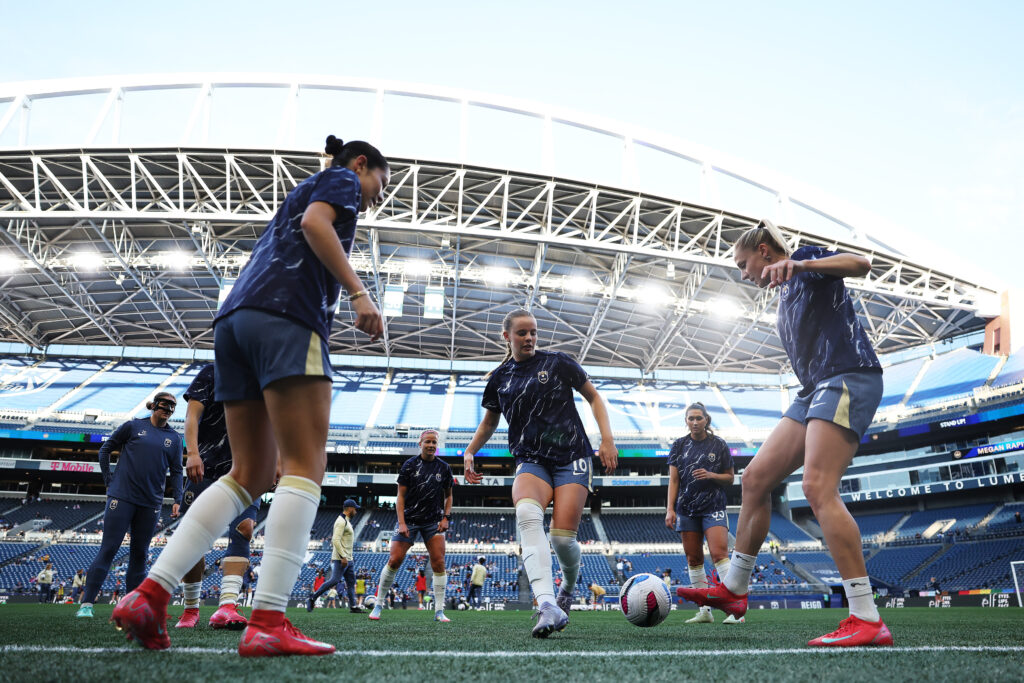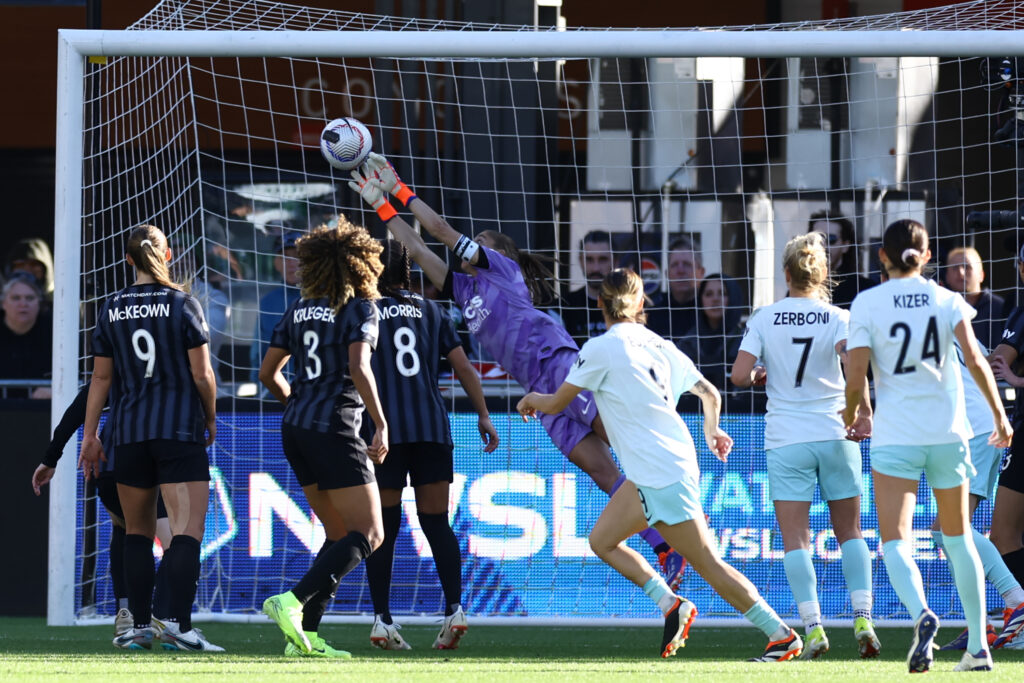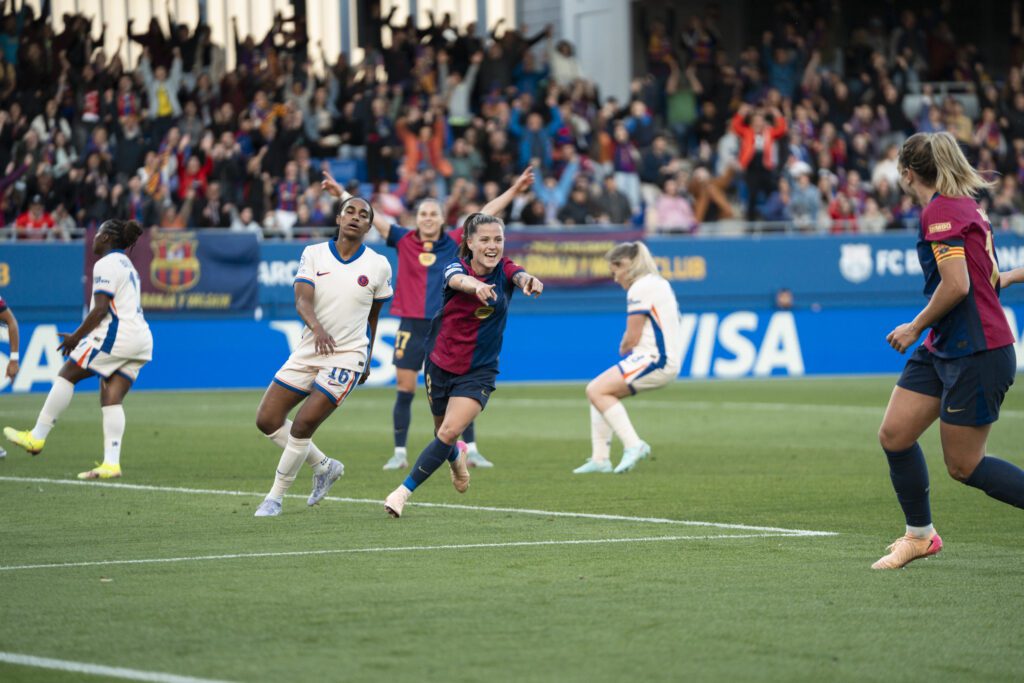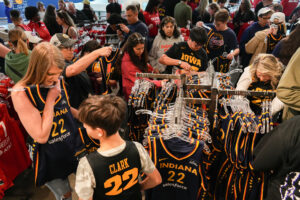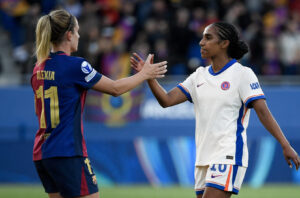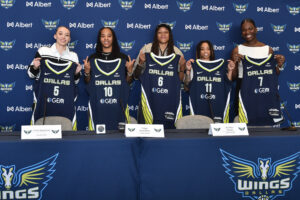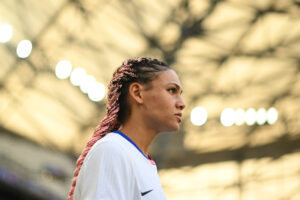Lucy Davis is a show jumping competitor who, as part of the US Show Jumping Team, took home silver at the 2016 Olympic Games in Rio de Janeiro. Below, she spoke with Just Women’s Sports about the dedication required to compete at the highest level and how she overcame her own post-Olympics burnout.
I know this is a dumb question, but how do you get a rookie horse to jump over its first obstacle? And what does training look like from there?
You just kind of point and shoot. I mean, they’re natural. They’re literally bred to be jumpers like thoroughbreds are bred for speed and lightness. Jumpers are also bred for lightness, but more so in terms of agility. And then each breed has their sort of build, and they start jumping when they’re four or five and then you just continue to refine all of the technical aspects. As a rider, your goal is to be able to go forwards, backwards, left and right, in an instant. So you just have to keep refining what we call a horse’s rideability. Each jump on a course is set in a specific way, so your ability to adjust and to communicate with the horse is paramount. And that comes over years of working with them.
What, in your mind, separates the elite riders from the merely good? Is it preparation, relationship with the horse, ability to adapt?
I think all of the above. What’s beautiful about our sport, and what may be puzzling to outside audiences, is that you have a pretty diverse set of top riders. It’s men and women. At the Olympics, I was the only person on the podium in their twenties. The majority were in their thirties and forties, and some in their fifties. So there’s no kind of body type or age or anything that determines your prime. It’s definitely about experience and the bond between specific horses. And I think what separates the really good riders from the kind of Olympic riders is the mental aspect. You basically have two minutes where you can’t make a mistake. You make a mistake, you have a rail, you’re done, you’re out. But even then, you have to keep fighting to not have more rails because every one counts. But that ability to hyper-focus needs to be refined over time. Some people have more of a natural feel with the horses, and if those people work hard and also have the mental game, they are usually elite.
When did you realize that horses were going to be a big part of your life?
Before I could walk. My mom would take me to the barn and put me on a horse, and I guess when she would try to make me leave the barn, I would start screaming. So I was definitely a crazy little pony girl from the beginning. It’s all I wanted to do. I tried to convince her to do homeschool and just grind, but thankfully she didn’t let me do that.
What do you think has specifically allowed you to be so successful at such a young age?
I think I grew up a little bit differently than a lot of young riders, at least in the US. Being in California, we have our own sort of rogue circuit. And I was always a tenacious child competitor. My mom used to have this thing that she made up called the sportsmanship award, and if at the end of the weekend, I was a good sport, she would get me like a pair of cool socks or something else that was pretty random and insignificant. But it was enough where I was like, Oh, I want those socks. I have to be nice even if I don’t win. But I was definitely pretty competitive. And then, I had a series of “right place at the right time” moments, where I got to work with one of the best trainers in the world, Markus Beerbaum. Starting at age 17, I had a wonderful mentorship there. And I got lucky with Barron [Davis’ horse at the 2016 Olympics], who basically took me from being competitive with good horses to having a horse that could actually do the things that I dreamed of doing. That kind of kicked everything into gear for me.
The stars definitely have to align, but there’s a certain point where it’s like everybody has goals. And everybody has setbacks on the way to those goals. I think I just tried to keep a really open mind about those setbacks and get creative about them and use them not as setbacks but as different avenues to get to where I wanted. A lot of people get really hung up on the pressure, but I’m kind of good at hermitting and closing that off. There was a lot of sweat and blood and tears behind the scenes, but that’s another one of those things where every athlete has to make sacrifices. I commuted weekly from Stanford to compete. In the summer, I was living in the middle of nowhere, Germany, biking to the barn in the rain every day. All those moments compiled into something.
What surprised you the most about your experience in Rio?
Um, how many people came to equestrian? [Laughs.] It was awesome, because we’re obviously not as mainstream as other sports, but actually within Brazil, there’s a huge part of Brazilian culture, and particularly within the military, that’s into equestrian. The facility itself was out on the edge of a military base in Rio, so we had all of these families and people that have grown up riding or have done it through military training come out. The crowds were awesome. But so was the whole experience. I always tell people that, I feel like anything you dream about or talk about for four years, once it happens is always kind of a letdown. And this was the only time in my life when the experience totally lived up to and surpassed expectations. There was definitely some fear beforehand that that wouldn’t be the case. Because I’ve been obsessed with going to the Olympics since I was six years old. So there was some panic, like, what if it’s not cool? But there’s this energy everywhere that comes from having so many athletes be in the same boat. There’s a camaraderie, and everybody is so in the zone. It’s inspiring.
You’ve talked elsewhere about experiencing burnout after the games. What was that like?
Yeah, I had a full on crisis. Like I said, the Olympics had been my dream since I was six years old. They were always my goal. Everything I did was somehow dictated by that. Every morning before class I went to the barn to ride. Every morning I was in Germany I biked to the barn in the rain, even though I could get a ride, because I told myself if I take any shortcuts, I’m not going to get to where I need to go. There were so many small things like that where you beat yourself up. And you never think about what happens after you reach your goal. After the Olympics, I took a month off to celebrate, and then I went straight back to work. I was in Holland. It was November and starting to get cold. I was living in another small town with no family or friends outside of the people I rode with. And it was kind of, well, okay, I reached my goal. So what am I working towards now?
I’m a very goal oriented person, and at that time I just didn’t have a direction. It was the first time I had thoughts about other things I could be doing with my life, especially seeing what other friends were doing after school. And then all my stuff got stolen, which led to everything just hitting all at once. I had a full blown kind of meltdown, which led me to come back to the States. It was a very dark sort of year, honestly, but ultimately, it was one of those things where I thought good, I had that meltdown, I got over it. And as I started competing again I realized that I still had the motivation to ride. I realized that I actually love doing what I’m doing and I desperately want to go to Tokyo. I want to keep building the Pony App and continue to design my life around horses because at the end of the day I can’t give that up. And now we’re here.
Do you think those were realizations you could have come to without the meltdown, or was that a prerequisite for some of these larger insights?
Oh no, that was definitely a prerequisite. I mean… we don’t have a season. Equestrian is all year round. It’s every weekend in non-coronavirus times. You’re kind of constantly hustling to build new mounts to get to their peak, and then you’re bringing up the other ones. You’re building a kind of portfolio, basically, and it’s sort of nonstop, and you’re traveling around, until one day you wake up and you’ve been, you know, running the rat race.
I think that pause allowed me to appreciate why I got into it in the first place, and why I was going to continue to do it for the time being. It let me focus on, okay, maybe other than Tokyo, I don’t have my next big, life’s-mission goal. But that’s okay. When I was in college, I was so hyper-focused and goal driven, and just kind of irrationally obsessed with making the Olympics. They were like the rings in the Lord of the Rings. They had this power over me where everything I did was focused on that goal. Now there’s this sort of mourning and admiring of my past self, as well as just accepting that I have different and other priorities. I still want some of the same things, like to go to the Olympics, but I know I can go about it differently and not let it consume me.
What does a typical day of training look like now and how will that change as we approach the 2021 Olympics?
Now I ride about five horses a day, right in the morning. And then usually in the afternoon or evening I do some kind of supplement training. Biking, running, various exercises that are riding related. Leading up to the Olympics, it’ll be a lot more preparation for competitions and trials, which involves a lot more jumping and our version of scrimmaging, where you’re doing practice rounds to simulate competition.
Do you think, generally speaking, athletes experience less doubt regarding their life trajectory or that they’re simply better trained to persevere through doubt?
I’d like to think the latter. What’s nice about this sort of training program, the competition schedule and the goal setting is that you impose a structure on your life that just permeates into other areas, so that when things go wrong, you have a structure and an idea of where you want to go. It’s a lot easier to deal with those setbacks as exciting challenges, rather than thinking like, Oh my God, this is a sign, or some kind of horrible diversion.
At this point in your career, how do you measure improvement?
Mmm, that’s a hard one. I think with horses we’re lucky because each new horse brings sort of a new adventure and a new challenge. So if I’m working with a younger horse and introducing them into the top level, and they go and have a clear round and I place sixth, I’ll be ecstatic. Whereas if I did the same competition with Barron, that result would be a letdown. I think setting horse-specific tasks allows you to be happy with small wins, because the number of clear rounds, and the number of wins for even the number one rider in the world, is much lower than the number of times you hit a rail or don’t win. So if you’re just focused on winning all the time, you’re really setting yourself up for unhappiness.
